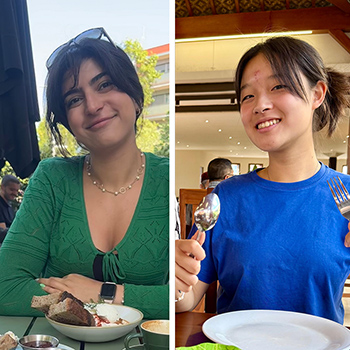 Mona Eskandaripour and Hannah Yoncer discuss the challenges of working part-time while studying.
Mona Eskandaripour and Hannah Yoncer discuss the challenges of working part-time while studying.
Studying medicine isn’t easy. Every week introduces a new system to learn, ten diseases to memorise, 15 acronyms to decode and about 400 new Anki cards to write up. But what about when you have a job alongside your studies? Balancing a part-time job with medical school isn’t rare but it’s an under-appreciated reality in many students’ lives.
Students work for a variety of reasons. For many students, it is a matter of financial obligation and livelihood; one student, who started an independent business before pivoting to medicine, continues to be responsible for its management. The BMA issued a release last February reporting that 43% of medical students surveyed had considered leaving or pausing their studies due to financial hardships, exacerbated by the “broken student finance system” in England.
Edinburgh is also an expensive city to live in – a £4 coffee is not uncommon. Current tuition fee and maintenance loans just don’t cover the cost of daily expenses, especially if you’re an international student or studying medicine as your second degree.
However, there isn’t a lot of guidance available online about working as a medical student. The NHS website briefly delves into the benefits of working in health-related roles with an introductory caveat about prioritising our studies and not sacrificing our long-term goals for ‘extra money’. So, for some students, work can double as a way of gaining experience within healthcare settings. As one student says, her carer job is “really great exposure for talking to patients… and will benefit [her] in the long run”.
Whatever the motivation, it is challenging to balance the demands of medical school with financial responsibilities, and still find time for self-care. So, I went hunting for top tips from my peers about what we’ve learned as we navigate our studies, work, and downtime.
Flexibility is key
First, the job itself is important – zero-hour contracts are the golden ticket, giving students that necessary flexibility within their schedule. One student arranges her job at the beginning of each month, slotting in shifts that comfortably work around her timetable and exam schedule. Some students specifically take on evening shifts or longer once-weekly shifts, noting it frees up the days or weekends for studying.
Learn on the job
Secondly, there are always ways to make efficient use of your time – whether that means buying an Anki deck, using quiet shifts to cram in a little extra studying, or, in healthcare jobs, speaking to clinical staff about their experiences and knowledge.
Find what works for you
You have to learn what works for you. One student recalls that working in his second year was much easier than the first, when he was still “getting used to high academic workload” while balancing work and social needs. It can be incredibly challenging to coordinate the time-commitments of everything you want to do. Personally, I always tackle the most immediate task and try not to feel too guilty when I do prioritise a hobby or social activity. Balance doesn’t mean doing everything—it means doing what’s sustainable.
Finding what works for you also means taking up the right vacancies for you. Think and search wide. Part-time work as a medical student involves a variety of considerations, so here are a few:
- Looking for flexibility with time? Zero-contract hours and absolute control over your shifts? Consider being a tutor online. A couple of platforms to look into include MyTutor or First Tutors. If you do not wish for platforms to take a portion of your rates, try setting up a business page on Facebook and posting adverts on relevant social media pages. If tutoring is not for you, and your strength lies in creative works (writing, design, music) check out opportunities in freelancing websites such as PeoplePerHour or UpWork. Participating in research that compensates you is another easy option: not only do they require small commitment, but also minimal effort (generally) from your part.
- Prefer something medical related? Look out for research assistant or internship applications from all sorts of academic or medical institutions, especially over the summer! This is a good way to ensure you have a fixed income over the summer, whilst allowing you a work-free semester to focus on studies.
- For steadier and more secure opportunities: I’m sure you’ve heard of residential assistants (RAs) at your accommodations—this job is not salaried but helps to significantly reduce your expensive Edinburgh accommodation fees.
Your options are limitless. Medics can be and have been everything from a barber to a life guard. Pick one that suits your area of expertise or background. But don’t click on just any opportunity that looks too good to be true, or without finding out more about it.
Facing challenges
Even when we take the best advice available, the struggles of this balancing act can always be exacerbated by other limitations, such as when a last-minute time-tabling change takes place. Suddenly, you’re faced with a lecture versus work conflict, feeling frustrated at the lost earning potential or missed learning opportunity.
Often in these circumstances, students reach out to their student advisors. Many have had positive experiences, recalling the great support that comes from an ally within the administration. But other times, the message we get from the University isn’t always the most supportive – asking us to quit or find a more convenient job with flexible hours or easier access to university is easier said than done.
One student was job-hunting for months before her current role. I remember when I was researching Edinburgh, I read about a student working for the NHS Staff Bank – the ideal healthcare-related job on a zero-hour contract. But, the Lothian Bank has been surprisingly difficult to get onto; finding the ideal job is not so simple.Balancing our medical studies with a part-time job isn’t about ‘extra money’ or a lack of commitment but a reflection of the growing pressures students face. It is a challenge that deserves recognition and support from the wider university systems. Until then, we will continue to adapt, survive and support each other.



